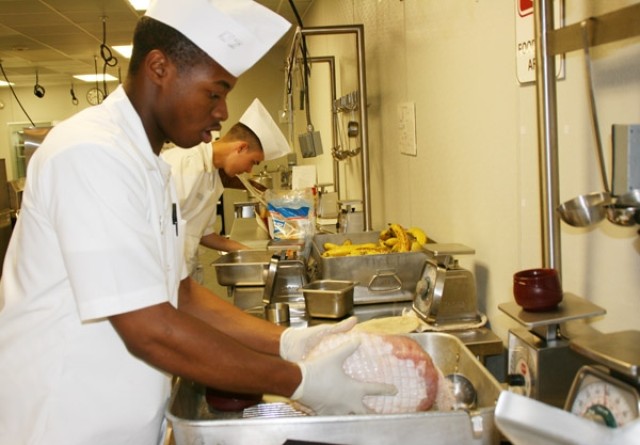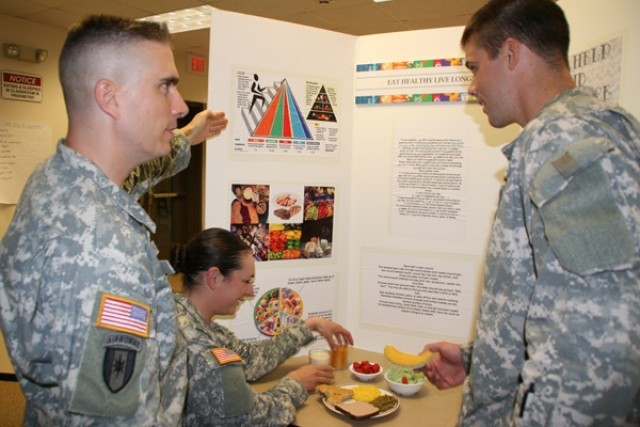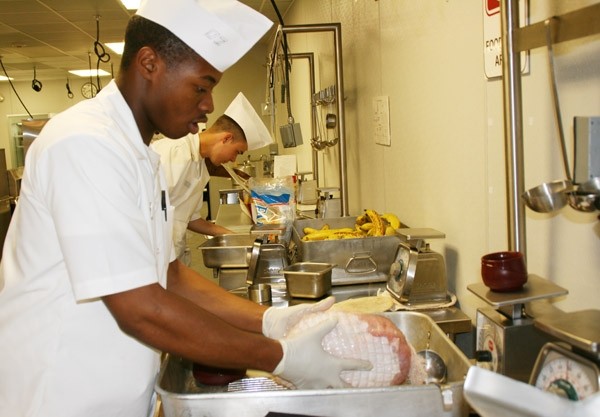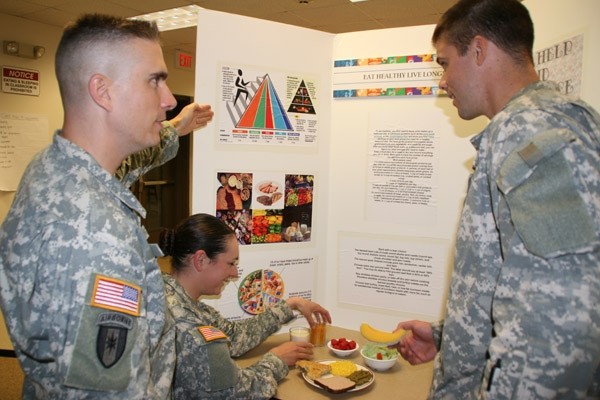FORT SAM HOUSTON, Texas --- Many people are on a quest to get healthier or fitter and start with changing their eating habits. As they seek out healthier food and drinks, they may run into a roadblock - nutritional labels. Almost all are filled with letters of the alphabet, like A, B and D, and strange ingredients that sound far from natural, let alone nutritional.
Fortunately, there are Soldiers, many at Fort Sam Houston, trained to decipher the nutritional label code, just one of the many skills required of nutrition care specialists.
The Soldiers learn their skills during the U.S. Army Nutrition Care Specialist Course, a hands-on, seven-week course at the Army Medical Department Center and School, Department of Medical Sciences at the Nutrition Education and Training Branch. The mission of the course is to train enlisted Soldiers as entry-level nutrition care specialists to support the U.S. Medical Department's mission of providing health care for America's Army during peacetime and war.
"Our Soldiers of 68M, D Company, 187th Medical Battalion must complete their nine-week training at Fort Lee, Va., as a food service specialist before coming here to be a nutrition care specialist," said Sgt. 1st Class Michael Morrill, chief enlisted instructor, Nutrition Education and Training Branch.
The food specialist course provides the basics of cooking, kitchen familiarity and sanitation. The nutrition care specialist instructors build on this learning and add knowledge about clinical dietetic concepts and functions, therapeutic and regular patient diet preparation, patient tray assembly service, Army medical field feeding concepts, and operations in a mobile or fixed environment.
The class consists of 18 to 25 students with 10 noncommissioned officers and four officer dietitian instructors.
The course is very hands-on with students putting their knowledge to the test by preparing two meal orders for a diabetic or special-need diet.
Before interacting with patients, students are given a tour of Brooke Army Medical Center to familiarize them with all aspects of patient feeding and food service layout.
Later, they are allowed to interact with patients at the hospital by interviewing them for their dietary needs, conducting nutrition risk screening, reviewing clinical documents, conducting sanitation inspection and preparing modified diets for inpatients.
In addition, students go out to the community and perform health promotion activities and explain healthy meals, portions and servings using a kiosk to educate the public. Toward the completion of the course they are tasked to prepare a specialty meal where they show off their skills to 50 to 75 invited guests.
Pvt. Brandon Osazuwa, 68M student, did not know how to cook before entering the military except for popping a "Hot Pocket" into the microwave. He did not know much about spices, how much to measure, what temperature to bake or what was healthy and what was not until he began training as a nutrition care specialist.
"The first time I prepared something and cooked it and tasted it, I was really amazed at myself that I actually made it and it turned out to be good," said Osazuwa.
Pvt. Ian Middleton, 68M student, joined the service because he needed money to go to school and had a friend, an Army nutritionist, who suggested that he go into the nutrition field. Today, Middleton is confident that he made a good decision and is fascinated about the field.
"The most challenging part of the course is to teach back to the class what you have learned. For some of us it is hard to speak in front of a group so really the challenge is within ourselves, but overall the class is not too bad," said Pvt. Ian Middleton, 68M student.
Since he started the course, Middleton said he is more conscientious and educated about foods and the nutritional facts on the food boxes.
The nutrition care specialist duties are operational nutrition and readiness preparation for deployment, humanitarian missions in both field and host nation fixed facilities, health promotion and wellness, and nutritional screening and assessment of all hospital patients through the lifecycle.
The course helps equip students for their Army careers. Once at their installation, their assignments may entail working with a Combat Support Hospital, U.S. Army Medical Department Activity, or as nutritional instructors.
Morrill said there is no certification at the end of the nutrition care specialist course, but there is an opportunity to earn one when students return back to their units.
They have the option to pursue a certification - ServSafe by the National Restaurant Association - that will help them in later civilian careers, or when they reach sergeant rank, they can request their unit pay for the certified dietitian manager's exam.
Pvt. Destiny Finch, 68M student, said she plans to pursue a future career in nutrition. "I chose the nutritional field because I'm interested and I'm going learn as much as I can. My future plans are to leave the military and open up a women's nutrition center back home in California in order to help women learn about nutrition and exercise."




Social Sharing